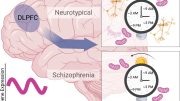
Two User Interfaces for the General Executive Function Brain Training Game. The left panel is the version where the child follows the moving light and clicks on it when it turns into a jewel that meets the criteria for being a target. There are two moving lights at the game level shown, and at the moment of the screenshot, one has just turned to a blue jewel. The clue at the top of the screen shows that the target is blue jewels. The right panel is a second user interface for the same cognitive demands and computer code. At the moment of the screenshot, the moving lens (yellow circle) has just revealed a target monkey in the crate, the child has clicked on it and the monkey is freed from the crate and is running away.
New research from Yale University shows that a computer-based brain training program helps improve student performance in reading and math — in some cases even more than individualized tutoring. The new study is published in Scientific Reports.
In a study of more than 500 second graders, math and reading scores on school-administered tests increased significantly more in children who used the brain training program Activate during the school year than in control classes. The effect on math achievement scores was greater than what has been reported for one-on-one tutoring and the effect on reading scores was greater than what has been reported for summer reading programs.
The findings illustrate that the benefits of the training, conducted three times a week for a four-month period, extend beyond getting better on the training games themselves and lead to improved learning of material that is very different from that in the games.
“The program increases focus, self-control, and memory — cognitive skills essential for learning,” said Dr. Bruce Wexler, professor emeritus of psychiatry at Yale and lead author of the study. “And these are exactly the cognitive skills affected by poverty, so we believe brain training programs like Activate can help reduce the achievement gaps related to poverty that are seen in schools across the country.”
In a second finding from the same study, researchers discovered that doing a five-minute brain warm-up game just before beginning an Activate math or reading curricular content game can increase math and reading performance. Different warm-up games produced maximal “cognitive priming” effects for math and reading. Cognitive priming with short video games could be more powerful than techniques teachers currently use to create mindsets to facilitate learning, Wexler said.
The study was conducted along with researchers from the National Center for Research on Evaluation, Standards, and Student Testing, CRESST/UCLA. Wexler is also a founder of C8 Sciences (C8Sciences.com), a Yale startup that markets Activate and other teaching support services.
Primary funding for the study came from the Roddenberry Foundation.
Reference: “Cognitive Priming and Cognitive Training: Immediate and Far Transfer to Academic Skills in Children” by Bruce E Wexler, Markus Iseli, Seth Leon, William Zaggle, Cynthia Rush, Annette Goodman, A. Esat Imal and Emily Bo, 12 September 2016, Scientific Reports.
DOI: 10.1038/srep32859









Be the first to comment on "Yale Study Shows Video Games Can Have Lasting Impact on Learning"